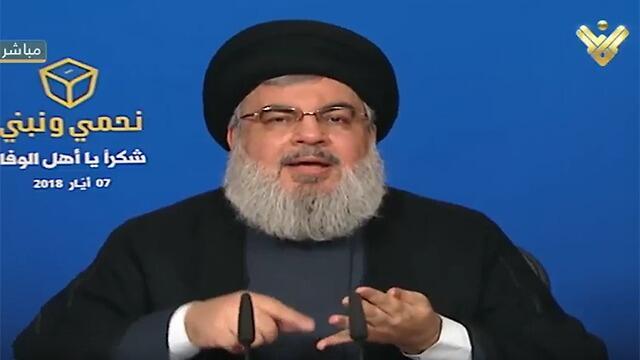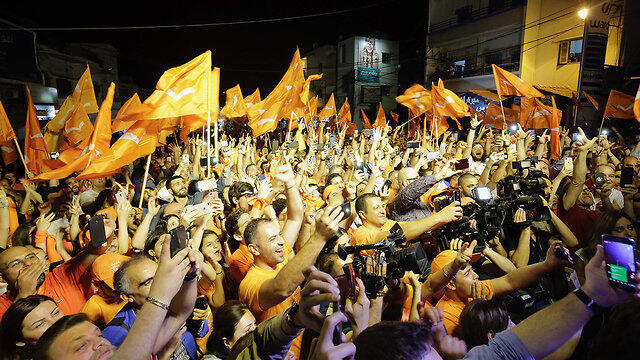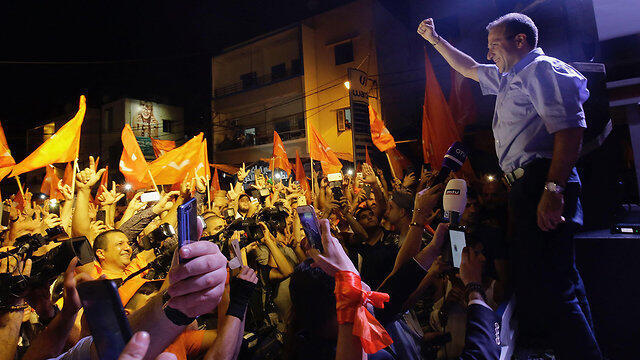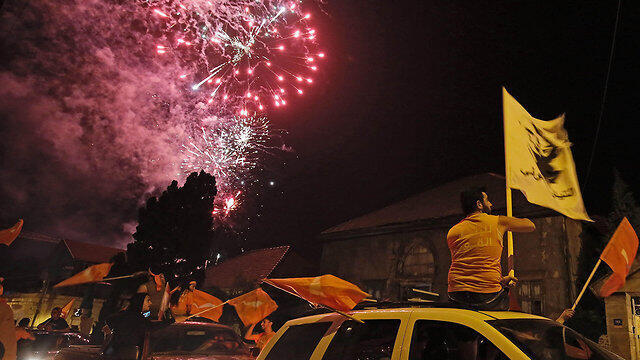Getting your Trinity Audio player ready...
Hezbollah leader Hassan Nasrallah celebrated Monday afternoon the significant gains made by the Iran-backed Shiite terror organization in parliamentary elections in Lebanon.
Unofficial results show that Hezbollah and its allies won over half the seats in parliament, while the main Western-backed faction led by Prime Minister Saad Hariri lost over a third of its seats.
"We have achieved our goals," Nasrallah said in a speech. "Everything we expected before the elections has happened. This is a new political victory for the resistance bloc."
The Hezbollah leader also commented on the mounting tensions and exchange of threats between Israel and Iran. "I am following what the (Israeli) leadership is saying, hearing its threats, and seeing what's happening with Iran and the big thing happening in Gaza. There is no way of knowing how this develops, and we have no time to waste," he said.
Nasrallah asserted that the way of the "army, the resistance and the people is still the only way to defend Lebanon," and praised the people of Lebanon for "holding steadfast" against Israel.
He also accused Israel of aiding the rebels seeking to overthrow Syrian President Bashar Assad by providing them with weapons and aerial assistance.
Hezbollah, along with allied groups and individuals, secured at least 67 seats, according to a Reuters calculation based on preliminary results for nearly all the seats obtained from politicians and campaigns and reported in Lebanese media.
Seats in the Lebanese parliament are divided according to a strict sectarian quota. The number of Hezbollah lawmakers was the same or little changed at around 13, but candidates supported by the group or allied to it made significant gains.
Hezbollah-backed Sunnis did well in Beirut, Tripoli and Sidon, strongholds of Hariri's Future Movement, the preliminary results showed. The pro-Hezbollah al-Akhbar newspaper declared the election a "slap" for Hariri on its front page.
But while Hariri's party lost over a third of its parliament seats, dropping from 33 to 21 MPs, he still emerged as the Sunni Muslim leader with the biggest bloc in the 128-seat house, making him the frontrunner to form the next government.
Initial indications showed the staunchly anti-Hezbollah Lebanese Forces, a Christian party, emerging as a big winner, nearly doubling its lawmakers to at least 15 from eight.
Lebanon's prime minister must be a Sunni under its sectarian power-sharing system. The new government, like the outgoing one, is expected to include all the main parties. Talks over cabinet posts are expected to take time.
"Hariri is going to be further weakened in any kind of government going forward," Andrew Tabler of the Washington Institute said. "His ability to substantially tame or restrain Hezbollah ... in Lebanon is going to be very limited."
"It will lead to more criticism of US military aid to the Lebanese Armed Forces" in Washington, he added.
Hezbollah's big allies include the Shi'ite Amal Movement led by Parliament Speaker Nabih Berri and the Christian Free Patriotic Movement of President Michel Aoun, a Hezbollah ally since 2006 who has said its arsenal is needed to defend Lebanon.
While Hezbollah and its allies do not always see eye to eye, their support for its arsenal is vital to the group in Lebanon, where its weapons have been a major point of friction for years.
Hezbollah lost ground in Baalbek-Hermel constituency, one of its strongholds. Two of 10 seats there were won by its foes, one by the Lebanese Forces and the other by Future. It also failed to take a Shi'ite seat in the coastal town of Byblos.
Hezbollah and its allies are not on course to win the two-thirds majority that would be required to pass big decisions such as changing the constitution.
Turnout was 49.2 percent, down from 54 percent the last time legislative elections were held nine years ago.





